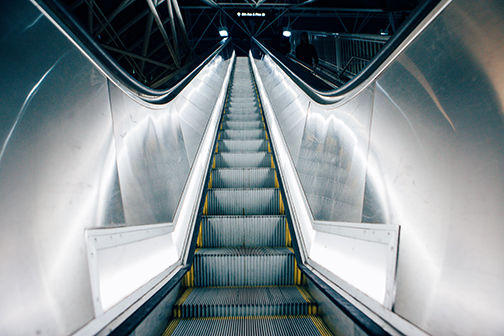
A new report from the MTA shows transit mechanics ignored repairs on an escalator in Midtown that broke down last February. The top steps of an escalator at the Fifth Avenue-53rd Street subway station were shredded to pieces during rush hour. No one was seriously injured, and a safety mechanism stopped the escalator before passengers were dragged into the pit of twisted metal. However, the escalator was full of commuters at the time and left many feeling they had nearly stepped into the teeth of disaster.
The escalator was ignored for six months by transit mechanics who were supposed to make sure it was safe, said a report released by the MTA inspector general. The audit says the worn parts on the escalator weren’t noticed because of “preventive maintenance visits which NYC Transit either canceled or did not complete.”
MISSED INSPECTIONS
The MTA’s Inspector General released a scathing report earlier this month on the Transit Authority’s escalator maintenance program, noting that a lack of work and accountability led to the escalator accident last year. She notes six months had gone by without scheduled maintenance on the escalator at the subway stop and parts just wore out over time until the escalator broke, endangering passengers. Preventive maintenance was scheduled on four separate dates between August 2018 and January 2019, but the maintenance was either canceled or left incomplete each time. According to the superintendent responsible for that station and the maintenance of that escalator, his team was severely understaffed. The MTA at the time vowed to inspect all 231 escalators in its system beginning right after the incident.
Part of the problem, the Inspector General report says, though, is that the MTA keeps no comprehensive records on escalator maintenance. There is no management report that captures an individual escalator’s history of canceled, delayed or incomplete preventative maintenance visits. This means that a manager can’t easily see the impact of a missed maintenance call. To check the maintenance history of any one escalator, management currently has to compile and analyze data from two separate sources, the report says. Subway supervisors also have no way of knowing when maintenance work on escalators is skipped or rescheduled — but MTA officials promised the IG’s office they would quickly put a tracking system in place.
MOVING FORWARD
Following last year’s wreck, the MTA has already begun to make some changes. They have hired more mechanics and helpers and have taken significant steps to overhaul their escalator maintenance program, revamping the process when it comes to the frequency of maintenance work. They have also started to roll out mobile devices to record maintenance work in real time. Other steps they’ve taken include a full review of how they compensate difficult-to-find tradespeople, and the development of a special training class to help managers in the field run reports- to improve operations. Additionally, New York City Transit responded to the Office of the Inspector General’s findings and accepted all its recommendations. The have issued a directive describing the circumstances under which preventive maintenance can be cancelled or deferred and established a new protocol so scheduled maintenance cannot be cancelled for an escalator that did not receive its preventive maintenance visit the prior month. New York City Transit says they will implement all the changes recommended by the inspector general by the end of the year.
FIELDBOSS stays current on industry trends to keep you informed on what’s happening in the elevator world. Read our blog and sign up for our newsletter for all the latest news.
#EscalatorSafety